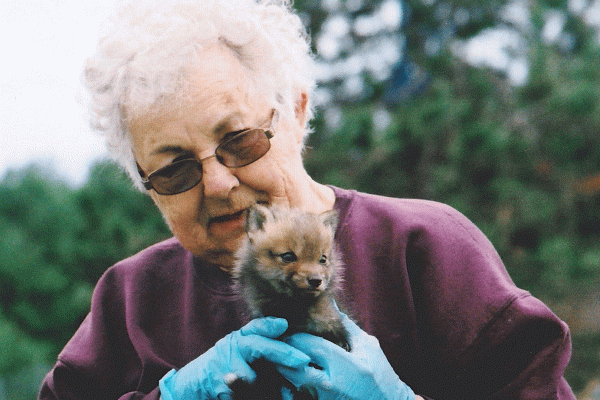While the recent signs of an early spring encourage most of us to anxiously look forward to warmer days and more outside activities, this time of year is one of mixed emotions for Don Cote and the volunteers at Duck Pond Wildlife Care Center.
These last weeks of winter still require shoveling, plowing, and sanding; freeing water tubs from ice; replacing soiled and sometimes frozen bedding; cleaning pens; doing multiple loads of daily laundry; washing and disinfecting food dishes; preparing meals; and tending to injured and sick animals. Wildlife rehabbers are not “fair weather” friends: whether it rains or snows or the wind howls, the critters must be cared for several times a day.
Don also takes care of a variety of his own ducks and geese year ‘round, requiring nesting materials, fresh water, and different feed. So, while the folks at Duck Pond won’t miss doing chores in frigid temperatures, they’re also thinking about the busyness of the coming spring and how to begin preparing for it.

In this Duck Pond Wildlife archive photo, Don’s late wife Carleen holds a baby fox
As Carleen [Cote] wrote in 2004, March is when they begin looking at catalogues and deciding what supplies will be needed. Orders for milk, milk replacements, supplements, electrolytes, vitamins, and foodstuffs for so many animals are mind boggling. Typical spring admissions include squirrels, chipmunks, woodchucks, skunks, raccoons, porcupines, foxes, opossums, fawns, and the occasional mice, rabbits, birds, coyotes, and bobcats. It’s hard to plan for so many different needs. In addition, Don has to be sure there are special bottles, nipples, and syringes for feeding the very young babies, as well as enough medications, bandages, and other first aid items for emergency treatment of wounds and broken bones on injured, abandoned, or orphaned animals that will soon arrive. With warmer weather come more admissions from vehicular accidents, especially youngsters who haven’t yet learned the dangers and survival skills of living in the wild. There are also admissions from well-meaning citizens who think little ones have been abandoned by their mothers, when in actuality they may be seeking food or a better den area to raise their brood.
On a happier and more rewarding note, this is the time of year to think about when and where to release the animals that have overwintered at Duck Pond because they were too young or not well enough for fall release. This May will see the three bobcat kittens, several deer, foxes, and raccoons return to the fields and forests that await them. Although I’m sure some of the young residents at the Care Center hold a special place in Don’s and the volunteers’ hearts, I’m also sure they feel a sense of gratitude to know their months of nurturing care truly made a difference.
Don plans to continue to gradually keep admissions and long-term residents to a more manageable level by transferring many rescued critters to other rehabbers who have so generously offered to assist in their care. Please check these websites to see if there is a rehabber closer to you to help make critter care at Duck Pond more practicable: www.mainevetmed.org/wildlife-rehabilitation or www.maine.gov/ifw/fish-wildlife/wildlife/living-with-wildlife/orphaned-injured-wildlife/rehabilitation.html – Donald Cote operates Duck Pond Wildlife Care Center on Rte. 3 in Vassalboro. It is a nonprofit State-permitted rehab facility supported by his own resources and outside donations. Mailing address: 1787 North Belfast Avenue, Vassalboro, ME 04989. Phone: (207) 445-4326. Please note that the prior email address is not being monitored at this time.
—by Jayne Winters, Natural Resources Council of Maine member from South China, Maine
Critter Chatter also appears monthly in the Town Line newspaper.










Leave a Reply